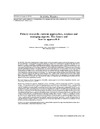Please use this identifier to cite or link to this item:
https://accedacris.ulpgc.es/jspui/handle/10553/1522
| Title: | Fishery research: current approaches, tensions and emerging aspects. The future and how to approach it | Authors: | Bas Peired, Carlos | UNESCO Clasification: | 3105 Peces y fauna silvestre 510208 Pesca |
Keywords: | Industria pesquera Pesca Gestión de recursos marinos |
Issue Date: | 2005 | Journal: | Scientia Marina | Abstract: | The current development of fishery research can be considered as much a technical development as a scientific-conceptual one. In relation to the technical development we analyse the evolution of the concepts fishing effort and fishing power, as well as vulnerability, availability and accessibility. In the conceptual analysis of the basic parameters we consider new contributions with regards to recruitment and evolution of populations based on concepts such as the system’s carrying capacity and the effect of inverse density dependence. The impact of the available space is analysed as well as the effect of the prey-predator relationship in the context of the flows between the different levels in the trophic web. We point out that fishery analysis strategies need to consider that, from both the biological and socio-economic points of view, the system is never balanced but rather is at the very limit or even over the limit. On the whole, fishing (human action on the resource) can be understood within the context of the ecosystem. This situation implies introducing the concept of uncertainty. Aspects such as ecosystem elasticity are analysed in their broadest sense. In these terms, recovery of an ecosystem and of Large Marine Ecosystems (LME) is still possible, but the result can be different due to the appearance of opportunistic species. Some concepts such as fuzzy sets, and chaos and fractal analysis are important tools for analysing the evolution and management of ecosystems exploited by fisheries. El desarrollo actual de la ciencia de las pesquerías es considerado tanto como desarrollo técnico como desarrollo científico-conceptual. En el primer aspecto se analiza la evolución de los conceptos: esfuerzo de pesca y poder de pesca. Así como la vulnerabilidad disponibilidad y accesibilidad. Se considera el análisis conceptual de los parámetros básicos con nuevas aportaciones sobre el reclutamiento y la evolución de las poblaciones a partir de conceptos como la capacidad de carga del sistema y el efecto de la densodependencia inversa. Se analiza el impacto del espacio disponible así como el efecto de la relación presa-depredador en el contexto de los flujos entre los diversos niveles de la relación trófica. La estrategia se sitúa considerando que tanto desde el punto de vista biológico como socieconómico el sistema no está nunca en equilibrio sino en el límite o fuera del mismo. En conjunto la pesca –acción del hombre sobre el recurso– se sitúa en el contexto del ecosistema. Esta situación implica introducir situaciones de incertidumbre. Se analizan aspectos como la elasticidad de los ecosistemas en su aspecto amplio. En estos términos la recomposición de un ecosistema y también de Large Marine Ecosystems (LME) es posible, pero el resultado puede ser diferente –aparición de especies oportunistas. Algunos conceptos como los conjuntos borrosos, el análisis caótico y la fractalidad son instrumentos importantes en el análisis de la evolución y el control de los ecosistemas depredados por la pesca. |
URI: | https://accedacris.ulpgc.es/handle/10553/1522 | ISSN: | 0214-8358 | Source: | Scientia Marina [ISSN0214-8358]. v. 69 (suplemento 1), pp. 139-156 |
| Appears in Collections: | Artículos |
Page view(s)
76
checked on Dec 7, 2024
Download(s)
128
checked on Dec 7, 2024
Google ScholarTM
Check
Share
Export metadata
Items in accedaCRIS are protected by copyright, with all rights reserved, unless otherwise indicated.
